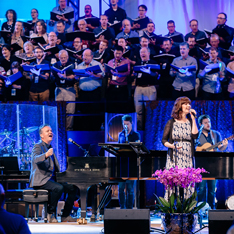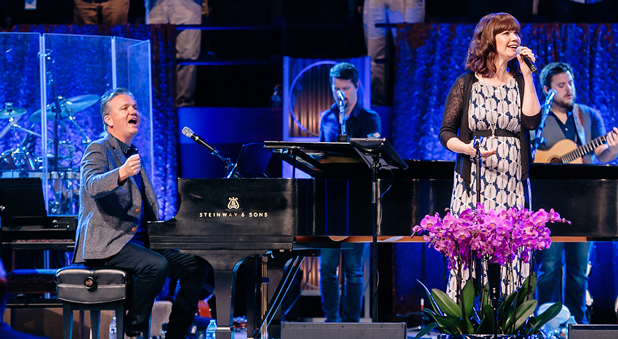We all know when a Christian song is good - we love it, can’t stop singing it - but what happens at the start of its life, back at the drawing board with the songwriter?
We recently covered this in Southern Cross (pdf). Here are some highlights -
To write a good song suitable for singing in Church, songwriter Rob Smith - who also lectures at Sydney Missionary and Bible College and is assistant director of Ministry Training and Development - believes it is necessary for the writer to have a solid theological foundation, although not necessarily formal theological training. But this is not enough: good songwriters are also able to phrase deep biblical truths poetically and memorably.
 Says Woodhouse “There is an intentionality about bringing more than just traditional people into the songwriting process. Often you might have a music team and you might collaborate with a few other musicians, maybe run it past your senior minister and then it is sung in church.
Says Woodhouse “There is an intentionality about bringing more than just traditional people into the songwriting process. Often you might have a music team and you might collaborate with a few other musicians, maybe run it past your senior minister and then it is sung in church.
“We think that with the gifts God has given his church we can go a bit broader than that, and encourage collaboration with people who might not traditionally think of themselves as musicians
In the end, a song is successful if it brings glory to the God who created the songwriter. Firstly in the songwriter’s own enjoyment of Him, and beyond that in the delight it brings to the church as they sing to the ord. For Woodhouse, the role of music in a church song is key - but not in the way most people might expect “A good song is one that serves God’s people by allowing God’s word to dwell richly in their hearts,” he says, “‘Richly’ is the key. Music is a gift to allow (God’s word to dwell) in a way that is rich and deep. You want music to move people; that’s why it’s there. You can’t get around it. It does move you”
He seeks to line up where the music moves its hearers with the lyrics and the Scriptures behind them.
“There is nothing to be ashamed of in using the gift of music God has given us to move people emotionally to where the scriptures are moving us,” he says. “That’s just using the beautiful, wonderful gift of music for a purpose.
“Sometimes, you can repeat a lyric a hundred times for emotional effect, so it becomes a bit of a mantra. There are much worse things than singing the name of Jesus 10 times!
Keith Getty, who created the song “In Christ Alone” with long-time writing partner Stuart Townend, has also written modern-day hymns with his wife Kristyn for more than a decade. In a 2006 interview with the Calvin Institute for Christian Worship he spoke about what was important to him when writing a song.
“It’s been several hundred years since Christian worship was as shallow as it is today,” he said. “Christianity is as universal as it has ever been, but people's understanding of their faith and the bible is disappointing.
“We try to write theological and biblical truth that speaks in everyday life, as Charles Wesley did. And I try to write melodies that large groups of people can sing. That is my filter: Can all ages sing this melody?
“From a lyrical point of view, we use the BIble terms in a poetic way to give the lyrics class and artistic credibility. But we write in language we would speak, that you can imagine saying.
 Songs are also the part of the service many congregants go away remembering - a fact that neither surprises nor alarms Smith. He freely acknowledges that a tune can stick in your brain much more easily than the spoken word. But he is quick to point out this means we need to work hard on having faithful biblical lyrics, so that while we hum a tune, we also remember good theology.
Songs are also the part of the service many congregants go away remembering - a fact that neither surprises nor alarms Smith. He freely acknowledges that a tune can stick in your brain much more easily than the spoken word. But he is quick to point out this means we need to work hard on having faithful biblical lyrics, so that while we hum a tune, we also remember good theology.
He underscores this in his recently published book Songs of the Saints, written with Mike Raiter: “The lyrical substance of our congregational songs is of utmost importance. No matter how good a tune might be it can never substitute for a lack of biblical clarity.
However, it is also true that putting an inappropriate or ill-fitting tune to solid biblical words is bound to severely limit their usefulness, if not render them ineffectual. So, if your aim is to sing the word of Christ faithfully and with the greatest edificatory effect, then we will be concerned not only with faithful lyrical substance but also with effective musical form.
This is one reason many songwriters elect to write new tunes for old hymns, or simply write music and use the words of a Psalm or an epistle as inspiration for the lyrics.
Photos: SMBC and gettymusic.com






















